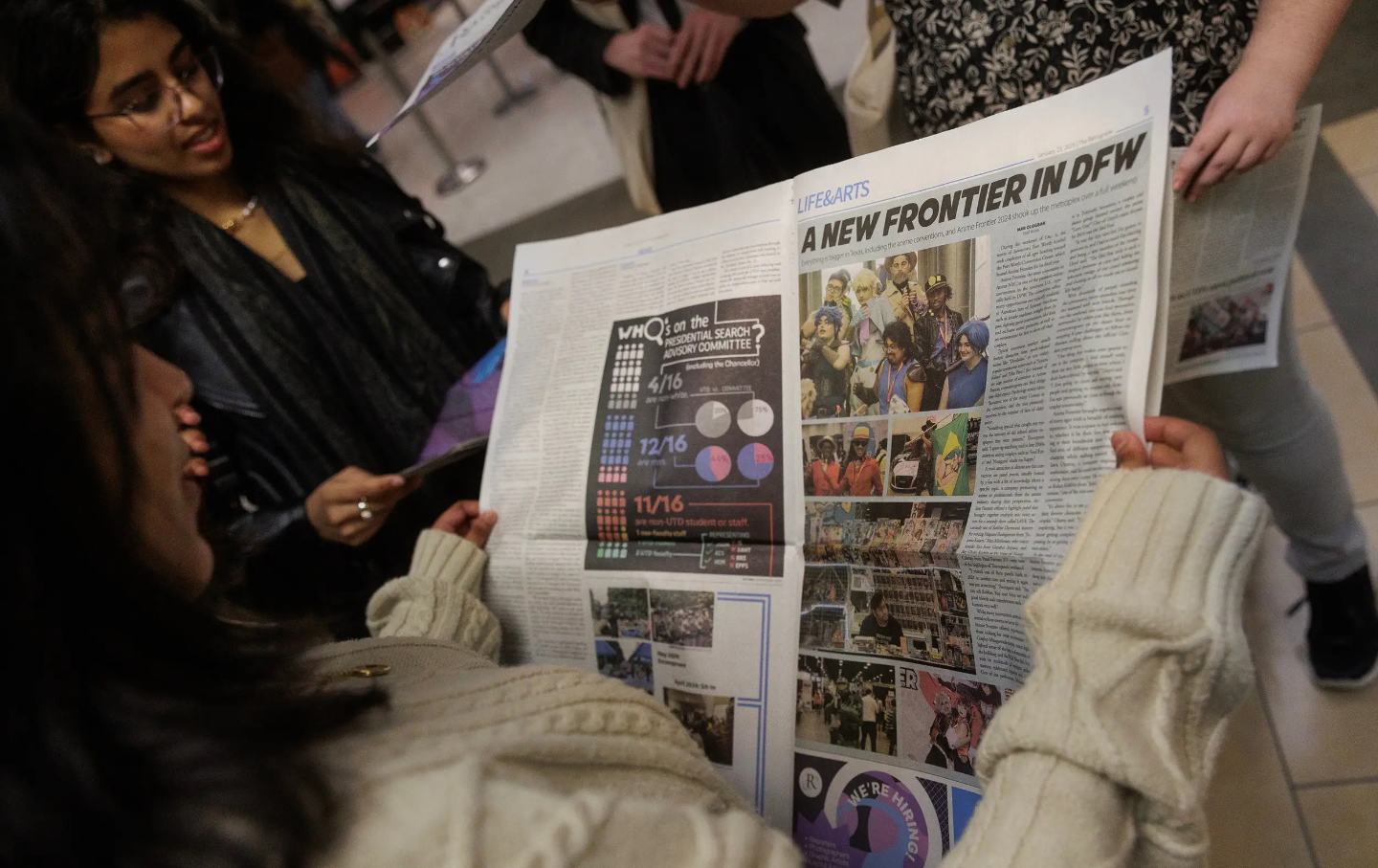Letters From the July 2024 Issue
The cost of psychotherapy… The Yemen script… Surface beauty… Correction…
The Cost of Psychotherapy
Re “Psychedelic Inequality,” by Alissa Quart [May 2024]: I am very sympathetic to Quart’s argument about the class advantage of access to psychedelic psychotherapies. However, I wish to point out that conventional psychotherapy, especially but not only psychoanalysis, is much more expensive, since it typically continues for years. In contrast, a few “journeys” with psychedelics that can apparently have a near-immediate effect cost a fraction of that amount. Legalization, price regulation, and insurance coverage would do much to prevent the abuse of profit-making entities.
Renate Bridenthal
Professor Emerita
Women’s and Gender Studies
The City University of New York
new york city
The Yemen Script
Re “The Great Humbling,” by David Klion [April 2024]: During his 2020 campaign, Joe Biden pledged to make Saudi Arabia a “pariah” and, upon taking office, halted transfers of offensive weapons. This was a remarkable turnabout: Since 2015, US arms, military support, and diplomatic cover had enabled a Saudi-led coalition in Yemen to bomb civilians, obstruct food and fuel imports, and drive the impoverished population to starvation and disease. Yet just a year and a half later, Biden fist-bumped Mohammed bin Salman in a bid to boost oil production, and his administration is now offering Saudi Arabia security guarantees in the hope of expanding the Abraham Accords. This arc exemplifies a point made by Klion in his review of Alexander Ward’s The Internationalists. As Democratic officials reckoned with Hillary Clinton’s loss in 2016, they sought to formulate a foreign policy oriented around middle-class interests. Now back in office, their unconventional thinking has often amounted to less than advertised.
It was during those years in the “wilderness” that veterans of the Obama administration first called for the rupture with Saudi Arabia. Amid mounting anti-war activism and congressional ire, which was only accelerated by the assassination of journalist Jamal Khashoggi, they issued an open letter calling for “a suspension of all U.S. support for the campaign in Yemen.” Obama had sought to temper the coalition’s apparent disregard for international humanitarian law by offering targeting assistance, an import inspection regime, and ultimately a pause on the transfer of precision-guided munitions. “Rather than learning from that failure,” the letter rebuked, “the Trump administration has doubled down” on its support. Among the signatories were Jake Sullivan and Antony Blinken.
Far from having learned any lessons themselves, Democratic officials appear to be reenacting the Yemen script in Gaza. We should hope that they will not once again wait until they are out of power to advocate a radically different course.
Zachary Laub
brooklyn, ny
Surface Beauty
In Stephanie Burt’s review of I Heard Her Call My Name, Lucy Sante’s memoir about transitioning from male to female, Burt notes Sante’s admission that she feared going out in public as a woman when she first came out [“Coming Home,” March 2024]. Burt imagines her thinking, “Will this wig work? Will this dress, and this lipstick? Why do I care so much?” Burt, herself a transgender woman, adds that she understands these fears: “After seven years on hormones,” she is “still anxious about my lipstick, and my hair, and my chin.” In light of these sentiments, her review concludes on a cheerful note because, clearly, Sante’s new life has taken her into “a brighter land of openness about her body and her desires.”
As a second-wave feminist, I find these sentences painful. When I think of all the on-the-ground documentation that someone who has transitioned from male to female has to contribute to our changing social history, it makes me sad to see that opportunity being squandered by concentrating on those details of an acculturated existence that, for millions of women and for centuries on end, have represented the stigmata of second-class citizenship. Please, I want to say to such a memoirist, now that you’re a woman, tell me what’s it like for you in the fullness of ordinary life, on the street or at work, in school, in the subway or the grocery store. You’ve lived a good part of your life walking the earth as a person of inherited privilege; now you’re wandering about inside the body of one still characterized by inherited inequality. Tell us what that feels like.
Vivian Gornick
new york city
Burt Replies
Unfortunately, that is what it feels like. Someday, perhaps someday soon, all the self-questioning, self-accusing pressures around surface beauty—looking appropriate, looking right, trying to look pretty, and feeling bad if you can’t or don’t—will come to seem wholly optional, never required, for all cis women and for all trans women and for femmes of every gender. Alas, we’re not there yet. Perhaps someday soon, too, trans women won’t feel the need to prove that we’re just like cis women, nor that we’re real women, in order to move through the world without shame. I’m afraid we’re not there yet either. That said, of course other stories need to be told. Some of those stories address inherited privileges, among them the privileges of growing up while adults see you as male: feeling entitled to speak, for example (as I did), and being encouraged to show ambition (as I was), and getting excused from the famous, or infamous, second shift. I have written about those privileges myself, as have other trans women (see, for a start, the terrific discussion of household labor in Chapter 15 of Imogen Binnie’s Nevada). We need those discussions. But Lucy Sante’s memoir focused elsewhere; so, as a matter of fairness, did my review.
Popular
“swipe left below to view more authors”Swipe →I should add that being called out by Vivian Gornick for how I review a New York–based memoir about gender feels a bit like having Patti Smith critique my onstage charisma, or Diana Taurasi deprecate my three-point shot. I’m flattered by the attention, but all too conscious that I will never measure up.
Stephanie Burt
belmont, ma
Correction
“Meet Claudia Sheinbaum,” in the April 2024 issue, incorrectly identified its author, Arturo Cano, as a cofounder of La Jornada and Reforma. Although he has reported for La Jornada for more than 20 years, he was not a founder of either publication.








